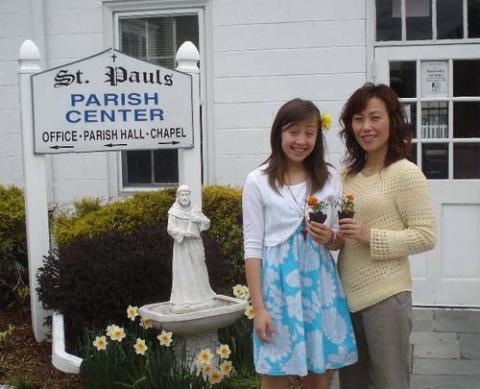
This Lent reflection book was given to my Good Shepherd Volunteer community members and me from a Good Shepherd sister. Reading the Bible is one part of my spirituality goals for my service year. (Provided photo)
Editor's note: Notes from the Field includes reports from young people volunteering in ministries of Catholic sisters. A partnership with Catholic Volunteer Network, the project began in the summer of 2015.
Growing up, I loved the Lenten season. It may be odd to say that I used to look forward to such a solemn period of sacrifice and reflection, but Lent meant spring was coming. It signaled the beginning of the end of a cold winter season.
When I was a kid, my church gave all the Sunday school children a calendar to follow throughout Lent, and I looked forward to getting one every year. Every day, the calendar gave you either a reflection question or a task to do to center yourself in God's presence.

My mom and me on Easter in 2011. At this point in my life, I still followed the children's Lenten calendar. (Provided photo)
One of my favorite tasks was to wait for a rainy day and then go jump in some puddles to remember that God is with you through the sunshine and rain. It felt so silly, but also purposeful. I felt as if I was tasked to feel joy and remember that God creates these moments of happiness.
This year, when Ash Wednesday came around, I was genuinely shocked. "Could this be?" I thought. "How did we already get this far in the year?"
We are coming to the first anniversary of the shutdown because of the COVID-19 pandemic, and I have been unsure of what to do with Lent when it's already been a full year of giving up any sense of normal life.
My community members and I have discussed how we've already given up so many milestones. Two of us graduated university last May but never got a real graduation. All three of us started a service year where our in-person retreats and interactions with the rest of the Good Shepherd Volunteer community outside of our New York City home was and still is limited. It seems as if the struggle this year is not what to give up, but how to observe Lent while continuing to sustain our mental health.

After a long period of cold and snow, this was one of the first warm and sunny days in New York City. Lent season, as much as we are solemn, makes me look forward to the upcoming spring. (Provided photo)
Back in my hometown in Connecticut, I belong to St. Paul's Episcopal Church, and the reverend there, Father Amjad, is very technologically advanced. Even before the pandemic, he started initiatives like recording the 10 a.m. Sunday service for the elderly who couldn't come in person and streaming church services live on Facebook.
This skill of expanding our church onto the internet obviously came in handy when our world did not allow us to worship in person. It also personally helped me continue to be engaged in this church community from afar, as I continue to get weekly newsletters from Father Amjad and invitations to come to the weekly 9 a.m. virtual service or join the virtual choir.

This Facebook post from the St. Paul's Episcopal Church Facebook page invites all to come to the 9 a.m. virtual service. (Provided screenshot)
For Ash Wednesday, Father Amjad sent an email with a reflection about how that first day of Lent serves as a reminder of our mortality. In church on this day, many Christians typically get ashes brushed upon their foreheads in the sign of a cross while hearing the phrase, "Remember that you are dust, and to dust you shall return." It's a phrase that reminds us that this life is not permanent; we are merely humans.
Father Amjad pointed out that this pandemic has been a constant reminder of our mortality, and he wondered: "When is it appropriate to be reminded of our mortality — every day or just once a year?" Many people I know seem to move on with their lives after they get their ashes without truly processing what it all means.
In his reflection, Father Amjad goes back to the story of the Garden of Eden, or the story of the first two humans, Adam and Eve. They are aware of this all-loving and all-knowing God, but there is temptation to be like this God and know everything as he* does. As they're walking with God, this temptation seems to take precedence over their walk, which then leads God to push Adam and Eve out of the garden because of the fear they might eat the fruit from the tree of life and live forever.

"The Rebuke of Adam and Eve" (1740, detail) by French artist Charles Joseph Natoire (Metropolitan Museum of Art)
Father Amjad wrote after explaining the story: "Since childhood, I have wondered, is death really a consequence of losing the walk with God in the Garden of Eden or were Adam and Eve going to die regardless?" He stated that this story confirmed that Adam and Eve being kicked out of the garden was actually an act of compassion from God.
God did not push these two humans away from the garden out of superficial fears, jealousy or the desire to see humans punished. I wholeheartedly believe what Father Amjad wrote in his reflection: "God suffers when we suffer."
I grew up always believing that God was not only the Father, Son and Holy Spirit, but a friend and confidant when life got rough. Whenever I had a bad day or was crying over something small, I always looked up and remembered that he was there with me.
Well, he is still here with me, which brings me to believe that the knowledge God didn't want Adam or Eve (and all humans) to have was for the best.
"When God knows everything, God knows the depth of the impact our actions have on our own lives and on the lives of others; that knowledge is painful," Father Amjad wrote.
Advertisement
From this, he gave an example of a parent knowing how much it would hurt if their adult child followed a destructive path. Parents have lived through experiences of pain, rejection and defeat, and can empathetically feel the pain of their child if that child were to choose such a mistaken path. Father Amjad suggested that we try and imagine what it might be like if we had to feel that pain for every single human being on this planet, just as God does, for we are all his children. I cannot fathom the suffering God must feel when thousands of people in this world suffer, especially in this pandemic, but this is why such an act of not allowing Adam and Eve to eat the fruit was an act of compassion.
In my own life, now that I'm a college graduate with a bachelor's degree, I equate God not wanting Adam and Eve to eat the fruit to my seeing the path that current high schoolers are choosing for themselves for their futures and trying to stop them from making the same mistakes I did. I love talking to teens and prospective college students because I enjoy trying to tell them everything that went wrong for me and how to avoid going through rough periods of life (and years and years of college debt). Of course, it's a bit different from a parent-and-child relationship, but there is this real and raw pain of having a lived experience and then seeing someone you know and love follow the same unbearable path you were once on.

During my time at St. John's University, I became an orientation leader to help guide incoming students through their transition between high school and college. I wanted to help students not only become acclimated to college life, but make the best of their education. (Provided photo)
So, do we have to think about our mortality every day or once a year, and would we as humans be infinite living beings if Adam and Eve chose not to fall into temptation? Instead of thinking about these questions that focus on the what-ifs, Father Amjad invites us to ask ourselves questions like, "How am I hurting God by not believing in his only begotten son? How is my rejection of the invitation to walk with God and move from glory to glory hurting my God and my fellow human beings?"
In the end, it's not about whether we need to put ashes on our head every day or whether we could have been immortal or not. Instead, this Lenten period is about acknowledging the Son in the Holy Trinity. The ashes are a reminder that Jesus, the Son of God, died for our sins, and it is not enough to remember such a moment in our Christian faith for only one day a year.
Lent is also a time to reflect on our own walk with God as Adam and Eve walked with God. From that story, we cannot dwell on our wishes to be infinite, but we must reflect upon how we're choosing to walk with God or not walk with God. What temptations are we focused on, and what is distracting us? How can we walk in better alignment with what God sees for us?
Instead of giving up something, as many people of faith do during this time, I've decided to have more puddle-jumping moments. I've decided to stop walking aimlessly and without thought, as I have been throughout the pandemic, and ask God to hold my hand for a while on my path to something better.
It is within the little moments, the sun seeping through the windows or the laughter of children playing at my neighborhood playground, where I want to find more of God. Living in a service year has helped me grow in my spirituality, and I am ready for Lent to propel me forward to see more of the blessings in both the sunshine and rain again.

I found a new park nearby, Fort Tryon, and got to watch the sunset over the George Washington Bridge. The city was quiet, and I felt at peace. In this moment, I thanked God and remembered he is in everything. (Provided photo)
*I reference God as "he" in my piece for flow purposes, but I personally believe God does not have a particular or distinct gender pronoun and can be referenced as "she" or "they."





